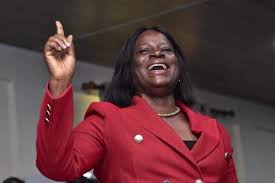The Liberian Senate is currently under scrutiny for engaging with the majority lawmakers of the House of Representatives amidst an ongoing leadership crisis. This concern was notably voiced by Senator Joseph Jallah of Lofa County during a Senate plenary session on November 26, 2024. He highlighted the senate’s decision to do business with the majority bloc, which recently declared the removal of Speaker J. Fonati Koffa. This action raises questions about the legitimacy and procedural integrity of the Senate’s collaboration, particularly in discussions of critical legislative measures that seek to amend the Liberia Maritime law and the framework governing the Liberia Sea Port and Regulatory Authority.
Senator Jallah’s apprehensions stem from the Senate’s dealings with only one faction of the House while the regular Speaker, J. Fonati Koffa, remains embroiled in the leadership conflict. He pointed out that significant legislative undertakings, including the proposed amendments that aim to create independent seaports and establish a sustainable framework for port operations in Liberia, should encompass all stakeholders involved, including the current Speaker. During the plenary session, he questioned the decision-making process that led to collaborating exclusively with a faction of the House instead of engaging all lawmakers for a more unified legislative approach, thus undermining democratic processes and protocols.
In response to Jallah’s concerns, the plenary descended into disorder, indicating a significant divide within the Senate regarding their recent actions. According to Senator Jallah, these steps taken without his participation signal a breach of consultative practices essential for legislative effectiveness. The disagreement emphasizes the internal strife not just within the House of Representatives but also within the Senate, showcasing how leadership disputes can hinder governance and legislative progress. It also raises broader questions regarding the role of collaborative governance in the face of political discord.
Vice President Jeremiah Koung, who serves as the President of the Liberian Senate, addressed the situation by asserting that there was a consultation meeting that Senator Jallah failed to attend. According to Koung, decisions made during this meeting were to be respected, and it was crucial for dissenting members to partake in discussions to foster collective understanding and action. This highlights a crucial aspect of political engagement and accountability within parliamentary systems, where participation and dialogue among members are vital for legislative coherence. Although Koung attempted to restore order by reiterating the importance of collective decision-making, the underlying tensions remain a concern.
The current political landscape of Liberia reflects a complex interplay between leadership struggles and legislative responsibilities. The ongoing tensions within the legislature could potentially disrupt vital legislative processes, particularly those that aim to address infrastructure and regulatory frameworks in sectors critical to the nation’s economic development. As the Senate navigates this controversy, the implications of these actions may impact the confidence of the Liberian public in their elected officials, alongside the overall effectiveness of the legislative process. Thus, as the lawmakers deliberate on crucial issues facing national governance, the need for a unified approach cannot be overstated.
Amidst these challenges, the potential consequences of short-sighted legislative alliances and failures to adhere to democratic processes pose significant obstacles for future governance. The discourse led by figures like Senator Jallah is crucial in championing accountability and transparency in government dealings. It raises the importance of inclusivity in legislative proceedings and reinforces the principle that democracy thrives on dialogue and collective action. The future of Liberia’s legislative efficacy will depend on the ability of its leaders to transcend political factions and work cohesively towards the common good, especially in the face of leadership crises that threaten to undermine the functional workings of the government.














